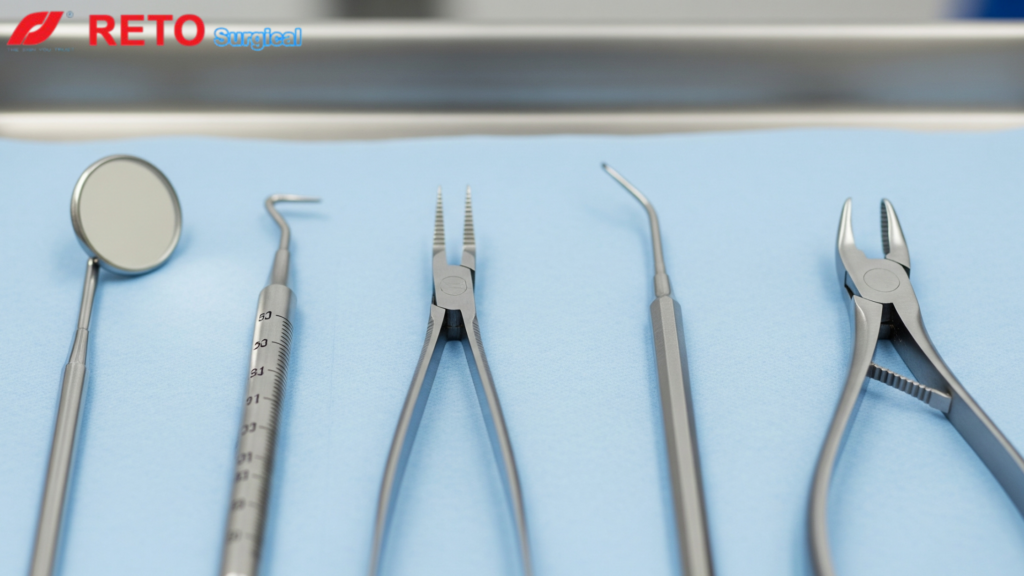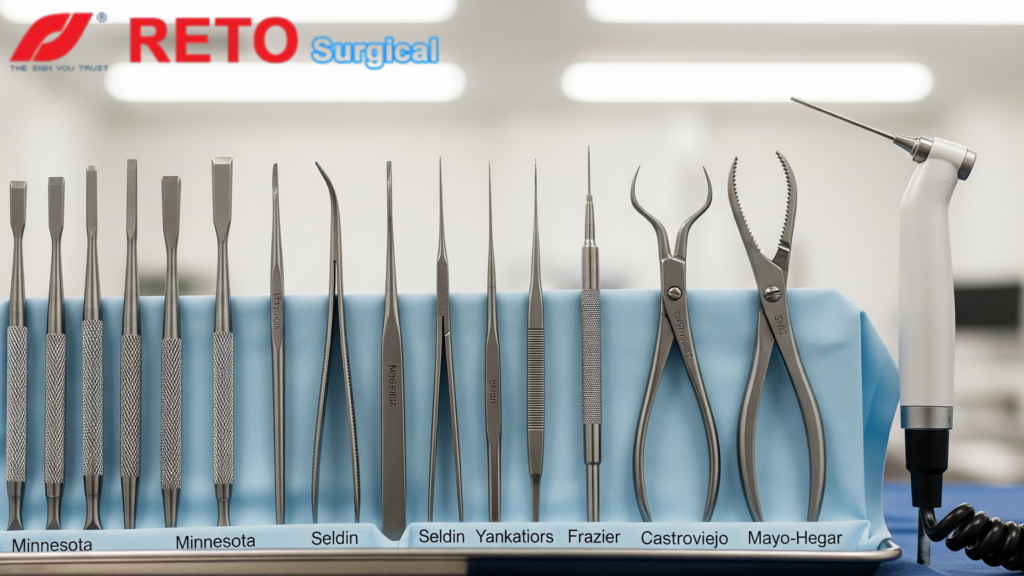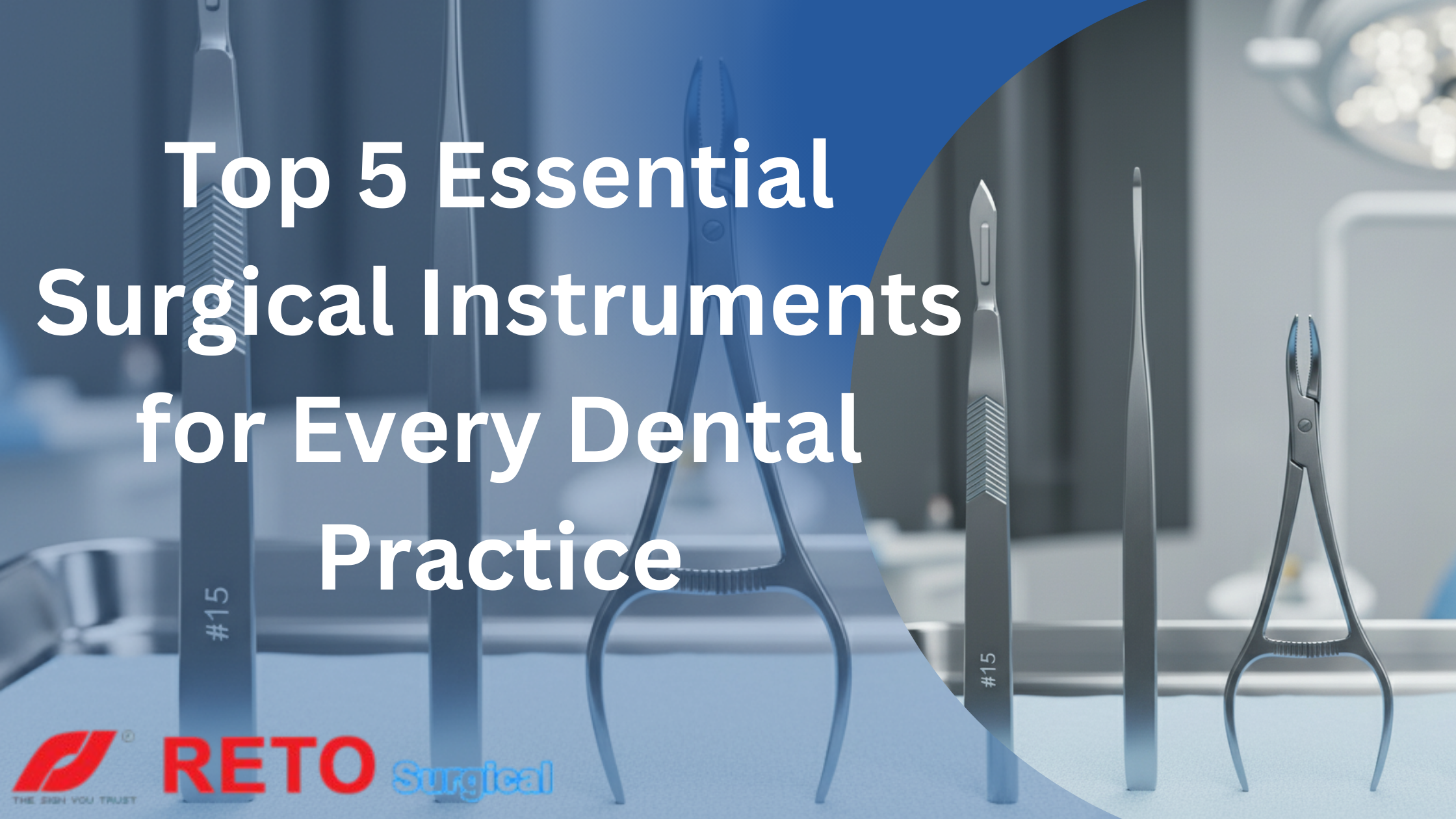Top 5 Essential Surgical Instruments for Every Dental Practice
5 Must-Have Basic Surgical Instruments in Every Dental Setup
Dental equipment is essential for both opening a new dental clinic and remodeling an existing one. As a result, knowing which dental equipment is of the highest quality for your practices becomes crucial. Here, it becomes essential to have a thorough understanding of both the most recent and upcoming technological tools. In order to assist you with your dental clinic purchases, we have compiled a list of the top 5 essential surgical tools for every practice.

What are Dental Surgical Instruments?
A vast range of specialized tools are used in dental surgery to carry out different operations. These tools can be roughly divided into five categories: suturing, tissue manipulation, anesthetic supply, examination, and extraction. Examples of tools used for specific jobs in the oral cavity include mouth props, forceps, elevators, scalpels, and curettes.
Why Are Surgical Instruments Important?
Modern dentistry relies heavily on dental Surgical Instruments The purpose of these special devices is to safely, effectively and properly. The effectiveness of the process mostly depends on the caliber and suitability of the used devices, whether it is a simple tooth extraction or complex oral surgery. Dental surgical equipment are important for the following main reasons:
Precision and Accuracy
Dental operations often work with delicate, limited oral regions. Due to their accuracy, equipment such as scalars, forceps and elevators enable dentists to do their work without damaging nearby tissues or teeth.
Patient Safety and Comfort
Top notch surgical equipment reduces damage to bones, veins and gums. In addition to guaranteeing patient safety, it also reduces post-operative pain and recovery time.
Better Planning for Diagnosis and Treatment
Some tools help diagnose oral diseases, such as periodontal examination and explorer. Accurate evaluation results in more effective treatment strategies and long -term dental health.
Assistance with Specialized Treatment
Advanced dental processes such as transplant placements, bone grafts and periodontal surgery require highly specific equipment. With the use of these devices, physicians can complete complex functions that will be difficult with standard devices.
Basic Surgical Instruments
For dental Surgical Instruments and surgical devices, versatility is essential because it guarantees the best results for effectiveness and safety. The five instruments listed below are required for any dentist or oral surgeon toolbox.

Bone Chisels
A dentist’s primary Surgical Instruments tool is a bone chisel, when cutting or re -shaping bone for processes such as implant placement, alveoloplasty, and tooth extraction. By removing the bone with greater accuracy and causing less damage to the surrounding tissues, these Surgical Instruments increase surgical results and speed up the healing process for the patient.
- Retractors
Retractors are one of the most important Surgical Instruments used in dentistry, which are useful for soft tissues such as gingiva, cheeks, and lips, while procedures are being done. They make the surgery easier to reach the site and appear more, which enables dentists to do their treatment with more secure and low tissue damage. They are usually used in transplant placements, periodontal processes and tooth extracts.
Surgical suctions
Water, saliva, blood and other debris are removed from the Surgical Instruments site using suction. To meet the demands of each patient, suction tips are also available in a variety of sizes and patterns. The debris must be removed to prevent the spread of contamination, especially blood.
Needle holders and dressing
By using needles and needle holders, the surgical site is closed. With their tight plier-like tips that hold the needles firmly, needle holders resemble tiny scissors. Curved surgical needles make suturing around the operative site simple. After the site has been sutured, dressing is applied to keep it clean. Betadine, a disinfectant, can be used to apply the dressing and stop infection.
Dental Lasers
One of the most efficient dental devices is a dental laser. Being less invasive, they reduce bleeding and pain for patients. Their uses include alignment of overgrowth gum tissue, preparing teeth for overall restorations and fixing tongue problems. The surrounding tissue causes less damage from the lasers, which also help in recovering quickly. Dental lasers are now simple to use for technological progress.
Conclusion
It is important to have suitable surgical equipment in your dental office, accuracy, safety and patient comfort during treatment. Each tool is required, from retractors that provide without access to bone chisel from retractors that facilitate accurate bone modification. While dressing and needle holders provide proper closure and infection control, suction instruments keep the area clean.
Last but not the least, Surgical Instruments dental lasers offer effectiveness and fast recovery. In addition to increasing the standard of your dental processes, investing in these five important equipment helps to succeed for a long time by promoting patient trust.
FAQs
Q1. Which tools are used in a basic dental setup?
A metal or plastic periodontal probe, two dental mirrors, two cotton palace, a suction holder and a hemostat are often included in the original set of dental devices. Scalpel, surgical scissors and retractors are essential Surgical Instruments tools.
Q2. What are the fundamental supplies utilized in dentistry?
The materials used in restoration operations include dental wax, cement, glass ionomers, gypsum materials, resin composites, dent base resins and other materials.
Q3. What applications can dental tools serve?
To detect tooth decay and evaluate gum health is made easier for dentists by devices including periodontal examination, dental explorers and mouth mirrors. The repair of teeth requires the use of restructural devices. These include equipment made to apply, form and eliminate materials like composite or amalgam.
Q4. What makes dental tools crucial?
To assess, treat, restore and preserve oral health, dentists and hygiene rely on dental tools. Each tool is necessary to increase the care of the patient, from identifying cavities to carrying extracts.
Q5. What is tooth material called?
One of the four main tissues consisting of teeth in humans and many other animals, including some fish species, are teeth enamel. It covers the crown of teeth and is the part that is often seen.

